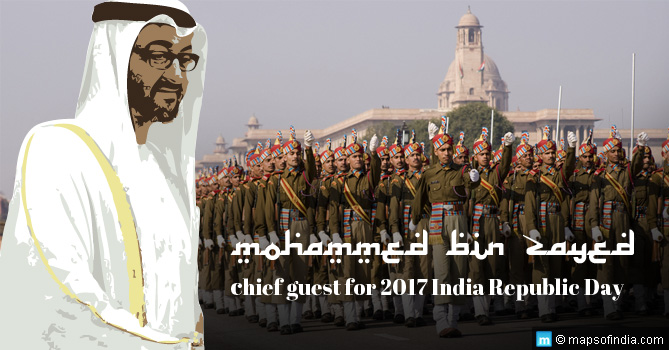In diplomacy, the surprise factor remains embedded to its core. In recent years, India has shown that it can use it better than others and that too in consonance with emergent situation. It gets reflected well in India’s invitation to Abu Dhabi’s Crown Prince, Sheikh Mohammed bin Zayed Al Nahyan as Chief Guest to the country’s Republic Day function in January 2017. He had earlier visited India this year in February.
When Islamabad is trying to win over Islamic countries in the aftermath of India-led surgical strikes on terrorists’ camps in Pakistan occupied Kashmir (PoK), New Delhi’s move has given a major blow to Pakistan’s diplomatic outreach. It should be recalled that the Abu Dhabi Crown Prince, who is also Deputy Supreme Commander of the United Arab Emirates’ armed forces, wields considerable influence over the political and security formation of his country.
Like Indian Prime Minister Narendra Modi, the Crown Prince is a strong advocate of modernity. He is also tooth and nail against terrorism. However, if no anti-India reaction came from the UAE or any other Gulf countries following Indian Army’s surgical strikes in PoK, it was because of the fact that New Delhi assiduously cultivated relations with the UAE, Saudi Arabia and Qatar — all members of the oil rich Gulf Cooperation Council — in the past two years.
Shift in the UAE’s policy
The UAE was the first Gulf country where Modi made his first ever Indian prime ministerial visit in the last 34 years. He visited the country in 2015. The visit remained highly successful as for the first time the UAE joined with India in calling on all countries to dismantle infrastructure of terrorism and in bringing perpetrators of terrorism to justice.
It may be remembered that besides Saudi Arabia and Pakistan, the UAE was the third country in the world which had recognized the Taliban-led government in Afghanistan in 1996. However, the joint statement issued by India and the UAE in the course of Modi’s two-day visit to the Gulf country was also aimed at Pakistan, an internationally recognized haven for terrorists. The joint statement alluded to a shift in the UAE’s policy. Hitherto recognized as a strategic ally of Pakistan, the UAE turned 360-degree to denounce cross border terrorism in India.
To the chagrin of Islamabad, India and the UAE inched closer to each other to seal an agreement on the issue of security and counter-terrorism. It expressed solidarity with India when terrorist attack took place on the Indian airforce base in Pathankot in January this year. It did the same when Indian army base camp was recently attacked in Uri in Jammu and Kashmir, resulting in the death of 19 soldiers. Rubbing salt on Pakistan’s wounds, on the invitation of Prime Minister Modi the Abu Dhabi Crown Prince chose to visit India in February this year. This led to further cementing of ties between the two countries.
Importance of the UAE for India
The UAE is a home to 2.6 million Indian expatriates, the largest expatriate community constituting as many as 30 percent of the total UAE population. Keralites form 40 percent of the total Indian expatriates in this Gulf country, which is also a home to Indian communities like Sindhis, Gujratis, Punjabis, Tamils and Goans. They are the source of major remittances to India.
According to the World Bank, UAE-based Indian expatriates contributed as much as $12.6 billion remittances to India in 2014. In comparison, only $11.2 billion remittances were received by India from the US which is home to affluent Indian expatriates. Nonetheless, the UAE is not only a home to blue-collar Indian workers, but also professionally qualified Indians. 15 to 20 percent professionally qualified Indians currently work in the UAE. Indians are also top investors in this Gulf country’s real estate. If a report from the Dubai Land Department is to be believed, Indians invested around $1.5 billion in Dubai’s reality market in 2015.
Trade relation between India and the UAE
Bilateral trade between the two countries stood at $59 billion in 2014-15. By 2020, it is expected to hit the $100 billion mark. In fact, the UAE is very much eager to become part of India’s growth story. It has agreed to invest $75 billion for the development of infrastructure, especially in railways, ports, roads, airports and industrial corridors and parks. Interestingly, when the economic slowdown has taken other GCC nations in its octopus grip, the UAE is only country in the region which is out of slowdown’s bound.
Nonetheless, for now, the broader message behind making the UAE Crown Prince as the chief guest of India’s Republic Day Parade in 2017 is to keep Pakistan out of bound of the Gulf, of which the UAE is an important part.




